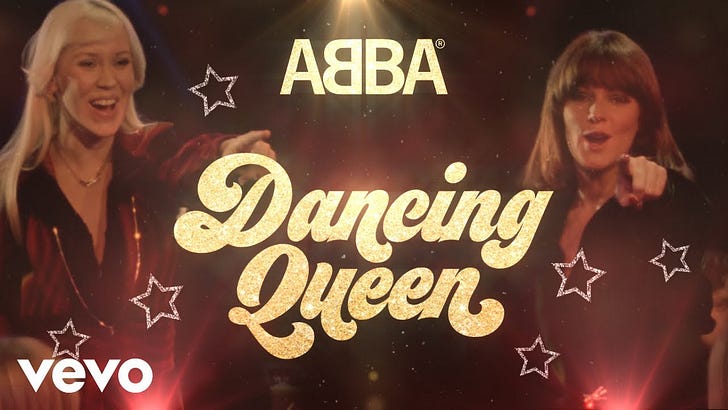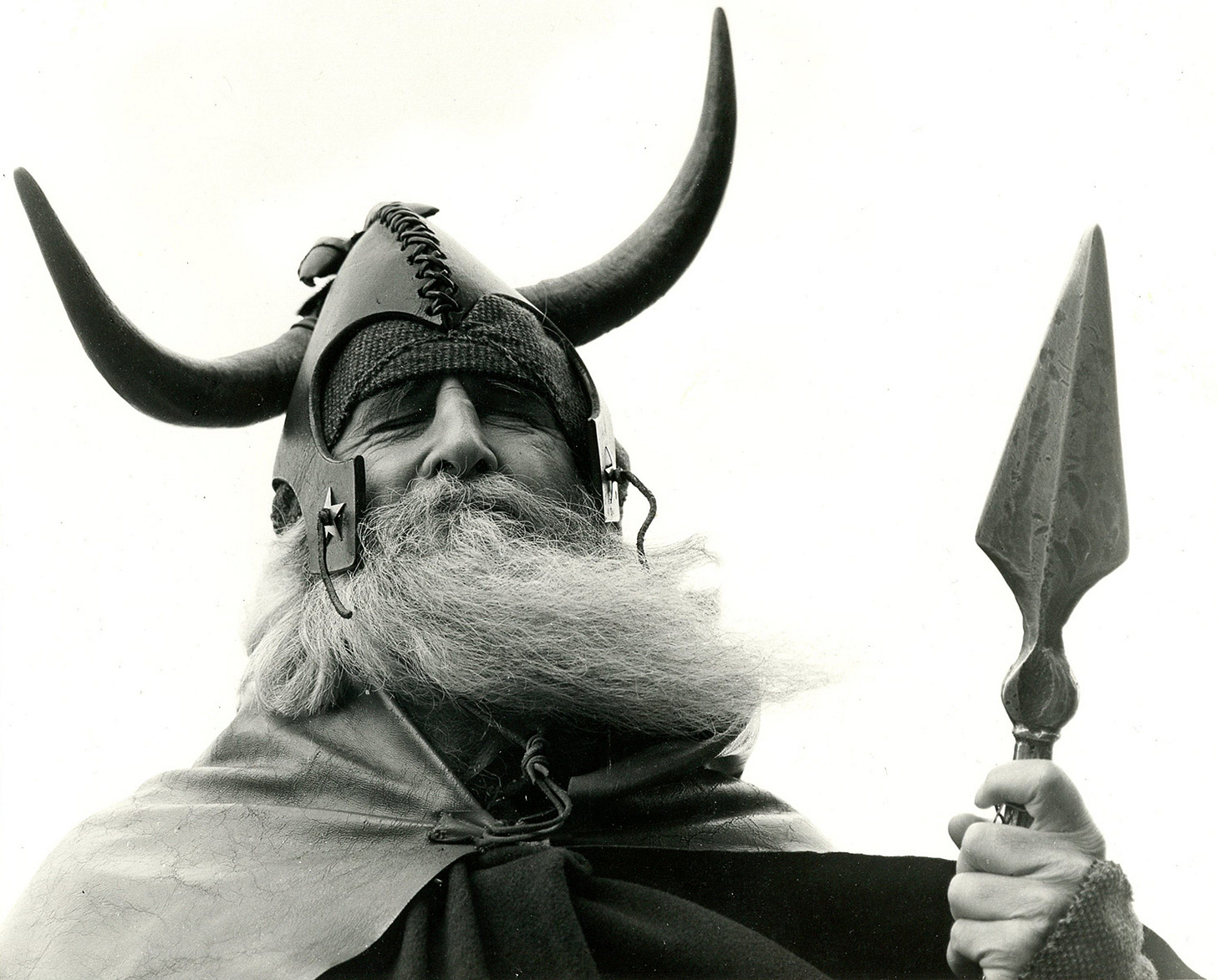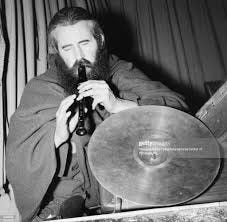What Chance Does a Moondog Have?
Notes on "Dancing Queen," the Viking of 6th Avenue and vanishing receptivity
Sunday’s New York Times Opinion section carried a sweet, thoughtful essay from Wilco frontman Jeff Tweedy about a conversion experience involving Abba’s “Dancing Queen.” In it, the Wilco singer and songwriter talks about hating the song when it first appeared in the mid 1970s, primarily because he was into punk rock and Abba’s hit was pure pop disco, therefore “situated deep in enemy territory.”
Then, some time after he’d started writing songs in earnest, Tweedy was in a grocery store. He was not listening and, he adds for crucial context, “not stoned,” and somehow, “Dancing Queen” reached out and grabbed him. He found himself reconsidering the tune. He realized he’d held onto a belief, a belief system really, that prevented him from appreciating the hit for its irresistible fundamental tuneness, and its craftsmanship.
It’s not like Tweedy didn’t have chances to reconsider before that day: “Dancing Queen” is up there on the big leaderboard of accidental listening. Along with “Hotel California” and “Brown Sugar” and many other iconic songs, it pelts us in stores and restaurants, in the boarding chutes of aircraft and the tedium of the waiting room, anywhere ignorable music is part of the atmosphere. Along with many others, I’ve written about how this aural ubiquity compels us to not listen, because our brains “know” what’s coming; whether we’re reassured by the comfortable familiarity or repelled by it, on some level curiosity is not activated. It’s a tyranny of the numbing sort.
Tweedy’s piece goes on to explore these default views and biases that come under the broad heading of receptivity. He writes: “That song taught me that I can’t ever completely trust my negative reactions.”
Here let’s pause, first to say Amen. Then to state the obvious: Many many music-obsessed people have had similar check-your-head experiences, and grown from them. But then, crucially, we must consider Tweedy’s trigger. He’s talking about Abba. Not Scriabin. Not Albert Ayler. Not even Tom Waits! If a professional musician can, after repeated exposure, hold fast to a dismissive view of an instantly grabby gazillion-selling single, what chance does a creator of music that’s a touch more eccentric have?
What chance does a Moondog have?
I read this Tweedy essay while taking another joyous mind-bending trip through the discography of Louis Hardin, the “Viking of 6th Avenue,” the blind musician and composer and maker of instruments who is one of the outsider titans of music. This incredibly resourceful polymath was tuned to the physical dimensions of music – when performing on the streets of New York, his preferred venue, he integrated the roars and whooshes of traffic (and the varied gaits of pedestrians) into his spontaneous sound. His percussion instruments, some fashioned from piano strings, stirred ancient-sounding frequencies. He wrote canons and drones and madrigals, looped simple melodies on top of horse-clopping cadences, transformed slight ideas into whiplashing elaborations which he notated, in braille, on cards.
Moondog’s music developed on the streets and spread via recordings (while his 1969 eponymous studio effort on Columbia remains dazzlingly fresh, the live On the Streets of New York, field recordings made by radio host Tony Schwartz, captures his intensity in raw form). Hardin’s first brush with fame came during the early days of rock and roll, when Cleveland DJ Alan Freed used his 1949 single, “Moondog Symphony,” as a theme song. Moondog brought a copyright infringement suit, and got jazz legend Benny Goodman and conductor Arturo Toscanini to testify. He won the case.
Later, Moondog’s ideas shaped the early works of minimalists Philip Glass (who hosted Moondog as a houseguest for a while) and Steve Reich, and his haunting song “All Is Loneliness” was sung by Janis Joplin on her first album with Big Brother and the Holding Company.
Moondog’s work directly related to his near-daily presence on the streets, and as a result stands as a different kind of accidental listening: The vast majority who passed this robed, extravagantly bearded character doing his thing in midtown walked on by. Those who were captivated by him were often profoundly transformed by the experience; among other things, they walked away with a broader definition of what music is. Or can be.
My recent Moondog tangent started with a tribute album called Songs and Symphoniques: The Music of Moondog, which involves the Ghost Train Orchestra and Kronos Quartet with Rufus Wainwright, Petra Haden and other singers. Released in September, the album celebrates (and recontextualizes) Moondog’s compositions as pieces warranting rediscovery; in his liner notes, Moondog biographer Robert Scotto laments that “Moondog is not a name you hear as frequently as you once did, especially in New York City.”
This effort aims to change that. The performances are uniformly solid and earnest, observant of the curious ticks of the original recordings and not overly burdened by reverence or hero worship. Still, they inevitably approach Moondog’s compositions as a repertory exercise. The animating force behind the curious notes and dizzy-making metric adventures has been dead since 1999; his absence haunts the project, at times impairing its levitational potential.
Here's one way to sense that: Check out the utterly magical A New Sound of an Old Instrument, released in 1979. It’s another “repertory” work of a sort, with German organists Fritz Storfinger and Wolfgang Schwering interpreting Moondog’s short, elliptical dances and fantasias. Listen for the rhythm, which is provided by Moondog with his feet and percussion. Here the Viking is playing a secondary, accompaniment role – but he’s at the center of the endeavor. The measured stomp of his downbeats somehow does more than just keep time – it lifts the music up, jolts it awake.
In his liner notes, Moondog explains a bit of what he was hearing when he wrote the music: “I think an organ can do anything a jazz band can do, as good, if not better. Moreover, when it comes to long, sustained contrapuntal lines, the organ is unapproachable. The organ sounds good with or without percussion. I added percussion to most of the pieces, which are in the dance idiom.”
Of course Moondog’s notion of dance music is different from Abba’s, which is different from Pitbull’s. All of them, though, depend on at least some momentary flash of open-mindedness from listeners.
In the relentless torrent of everything-all-the-time music culture, attention is the most precious resource. Music doesn’t unfold before us instantly the way a scene in a film does; sometimes it takes repeated exposures to clarify that first impression (or the tenth!). Sometimes a response that begins with incomprehension or revulsion becomes a journey of awe, or admiration. Doing this is a choice – to be intentionally receptive to the unknown, and to stay with it. I’d argue that’s all Moondog’s music needs. It’s not some brainy ivory-tower acquired taste, it just takes some getting used to, and in a sense, that process is exactly what Tweedy describes in his confession about Abba. All those initially loathed, accidental, unasked-for whirls through “Dancing Queen” might have softened Tweedy for the kill shot. What matters is that when it randomly happened, he was open to it.








I like Abba and Moondog. Subscribed!